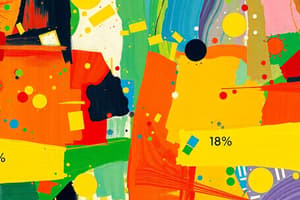Podcast
Questions and Answers
What is the basic economic problem?
What is the basic economic problem?
- Overproduction of goods and services
- Unlimited resources
- Scarcity of resources (correct)
- Excess of labor
Which of the following is an economic good?
Which of the following is an economic good?
- Sunlight
- Air
- Rainwater
- Furniture (correct)
What is the reward for the factor of production 'land'?
What is the reward for the factor of production 'land'?
- Wages
- Profits
- Interest
- Rent (correct)
Who are responsible for organizing and combining resources in a firm?
Who are responsible for organizing and combining resources in a firm?
Which of the following is an example of a durable consumer good?
Which of the following is an example of a durable consumer good?
What does occupational mobility refer to?
What does occupational mobility refer to?
What influences changes in the quantity and quality of factors of production?
What influences changes in the quantity and quality of factors of production?
What is the opportunity cost of a city building a hospital on land it owns?
What is the opportunity cost of a city building a hospital on land it owns?
What does the production possibility curve (PPC) show?
What does the production possibility curve (PPC) show?
Which of the following factors contributes to geographical mobility?
Which of the following factors contributes to geographical mobility?
Flashcards are hidden until you start studying
Study Notes
The Basic Economic Problem
- The fundamental economic problem is the scarcity of resources to meet unlimited consumer wants and needs.
Economic and Free Goods
- Economic goods are scarce, require resources to produce, and have an opportunity cost.
- Free goods are abundant, available, and do not require resources (e.g., air).
The Factors of Production
- Land: natural resources used in production (e.g., land).
- Labour: human resources used in production (e.g., workers).
- Capital: manufactured resources used to produce goods and services (e.g., tractors).
- Enterprise: the skills and willingness of a business person required to organize productive activities.
Rewards for Factors of Production
- Land: Rent
- Labour: Wages
- Capital: Interest
- Enterprise: Profits
Mobility of Factors
- Geographical Mobility: the willingness and ability to relocate for employment purposes, influenced by family ties, cost of living, etc.
- Occupational Mobility: the ease of changing between jobs, dependent on cost, training period, and educational professions.
Changes in the Quantity or Quality of Factors of Production
- Factors influencing changes: cost, government policies, new technology, migration of labour, improved education and healthcare, and weather conditions.
Opportunity Cost
- The cost of the next best alternative when choosing the use of a resource.
- The opportunity cost of a decision to use resources in one way means giving up the opportunity to use them in another way.
- Economics aims to find the most efficient resource allocation to maximize economic welfare.
Production Possibility Curves (PPC) Diagrams
- PPCs show the maximum combinations of two goods and services an economy can produce with its limited resources.
- Each combination represents a choice, and PPCs can be used to illustrate opportunity costs.
Studying That Suits You
Use AI to generate personalized quizzes and flashcards to suit your learning preferences.




